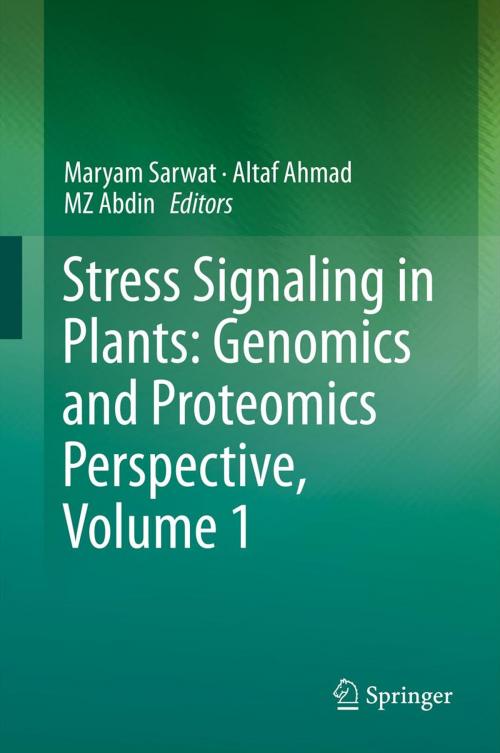Stress Signaling in Plants: Genomics and Proteomics Perspective, Volume 1
Nonfiction, Science & Nature, Science, Biological Sciences, Botany| Author: | ISBN: | 9781461463726 | |
| Publisher: | Springer New York | Publication: | June 21, 2013 |
| Imprint: | Springer | Language: | English |
| Author: | |
| ISBN: | 9781461463726 |
| Publisher: | Springer New York |
| Publication: | June 21, 2013 |
| Imprint: | Springer |
| Language: | English |
Plant diseases, extreme weather caused by climate change, drought and an increase in metals in soil are amongst the major limiting factors of crop production worldwide. They devastate not only food supply but also the economy of a nation. Keeping in view of the global food scarcity, there is, an urgent need to develop crop plants with increased stress tolerance so as to meet the global food demands and to preserve the quality of our planet. In order to do this, it is necessary to understand how plants react and adapt to stress from the genomic and proteomic perspective. Plants adapt to stress conditions by activation of cascades of molecular mechanisms, which result in alterations in gene expression and synthesis of protective proteins/compounds. From the perception of the stimulus to transduction of the signal, followed by an appropriate response, the plants employ a complex network of primary and secondary messenger molecules. Cell signaling is the component of a complex system of communication that directs basic cellular activities and synchronizes cell actions. Cells exercise a large number of noticeably distinct signaling pathways to regulate their activity. In order to contend with different environmental adversities plants have developed a series of mechanisms at the physiological, cellular and molecular level. This two volume set takes an in-depth look at the Stress Signaling in Plants from a uniquely genomic and proteomics perspective. Stress Signaling in Plants offers a comprehensive treatise on the Chapter, covering all of the signaling pathways and mechanisms that have been researched so far. Each chapter provides in-depth explanation of what we currently know of a particular aspect of stress signaling and where we are headed. All authors have currently agreed and abstracts have been complied for the first volume, due out midway through 2012. We aim to have the second volume out at the beginning of 2013.
Plant diseases, extreme weather caused by climate change, drought and an increase in metals in soil are amongst the major limiting factors of crop production worldwide. They devastate not only food supply but also the economy of a nation. Keeping in view of the global food scarcity, there is, an urgent need to develop crop plants with increased stress tolerance so as to meet the global food demands and to preserve the quality of our planet. In order to do this, it is necessary to understand how plants react and adapt to stress from the genomic and proteomic perspective. Plants adapt to stress conditions by activation of cascades of molecular mechanisms, which result in alterations in gene expression and synthesis of protective proteins/compounds. From the perception of the stimulus to transduction of the signal, followed by an appropriate response, the plants employ a complex network of primary and secondary messenger molecules. Cell signaling is the component of a complex system of communication that directs basic cellular activities and synchronizes cell actions. Cells exercise a large number of noticeably distinct signaling pathways to regulate their activity. In order to contend with different environmental adversities plants have developed a series of mechanisms at the physiological, cellular and molecular level. This two volume set takes an in-depth look at the Stress Signaling in Plants from a uniquely genomic and proteomics perspective. Stress Signaling in Plants offers a comprehensive treatise on the Chapter, covering all of the signaling pathways and mechanisms that have been researched so far. Each chapter provides in-depth explanation of what we currently know of a particular aspect of stress signaling and where we are headed. All authors have currently agreed and abstracts have been complied for the first volume, due out midway through 2012. We aim to have the second volume out at the beginning of 2013.















